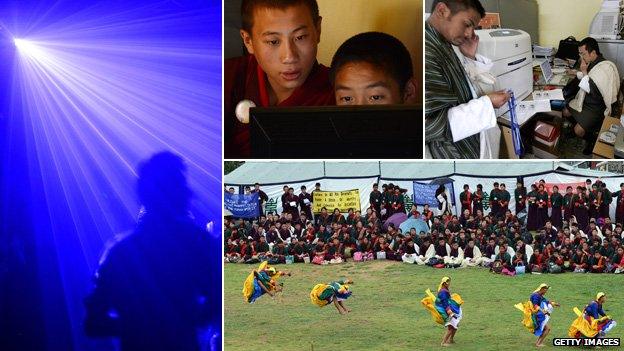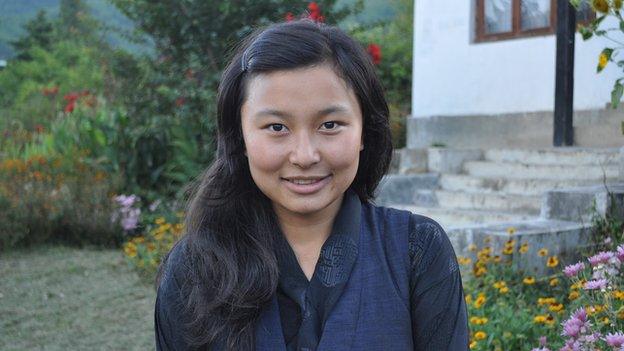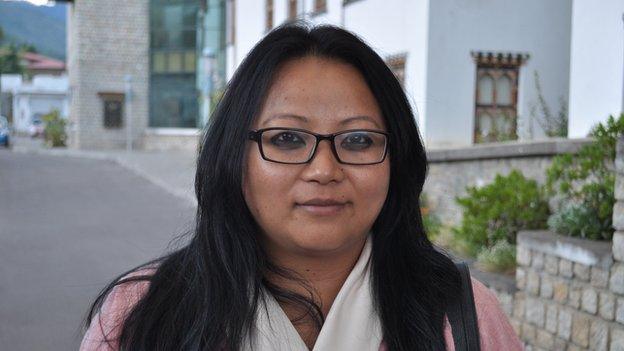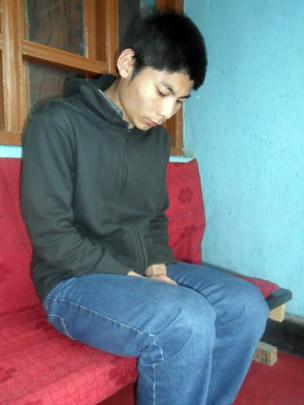How social media woke up Bhutan
- Published

The Himalayan kingdom of Bhutan was almost totally isolated from the rest of the world until the 1970s. The internet and television arrived only in 1999.
Although it stepped into the internet age very late, social media websites like Facebook and Twitter have caught on rapidly. Today there are an estimated 80,000 Facebook users in Bhutan - more than 10% of its population.
Buddhist Bhutan used to be a deeply conservative country where dissent and criticism were rare. But social media is giving an opportunity for Bhutanese youth to express their views and force change.
The BBC's Anbarasan Ethirajan met young Bhutanese in the capital Thimphu, who described how social media is changing their society.
'We can talk about sex now'
Sonam Yangden, a radio jockey for Bhutan's Kuzoo FM, describes a revolution in Bhutan's attitude to conversations about sex and intimacy.

Sonam Yangden believes the Internet makes her more creative
Social media has had a massive impact - mostly good. We are getting to know what happens inside and outside the country. So much information is coming through.
My generation grew up with the internet and television and I believe that makes me more creative. It allows me to know more things. Social networks give you a platform to write whatever you want. Ours is a conservative society but thanks to social media platforms now there are campaigns for issues like same-sex marriages and other sensitive issues.
Sex education is another area where social media has played an important role in Bhutan. I happen to be a voluntary member of a sexual education awareness programme. We try to spread awareness about sexual education through social media and why it is important young people should know about it.
And it was only after it started on social media that people started talking about it in mass media - it even led to debates on television.
Initially, people were anonymous but later on many of them started discussing these issues using their own identities. We would not have talked about such things 10 years ago.
'We learned to disagree'
Tara Limbu, a journalist and social media activist, says young people now have a platform to talk about what they really think - and disagree with each other.

Tara Limbu says it was refreshing to see disagreements online
In Bhutan, more than 60% of the population are below the age of 22.
Youngsters are increasingly using social media to network. They have started to take up social and political issues and get involved in discussions.
For example, there is one page called Bhutan Street Fashion, external. That page is very popular and it has more followers than any other mainstream media in Bhutan.
The page discusses everything from fashion to social issues to politics. The younger generation have started using social media to promote their causes. In Bhutan we are not used to criticising the government or politicians.
But social media has changed all that. During the parliamentary elections [in 2013], we could see how people were active on social media - that is where the discourse was. Remember, these latest elections were only our second ever parliamentary polls.
But this time people were criticising political parties and their policies very openly using their real identities. We could also see divisions within friends and families based on politics.
Social media is what gave us a platform to do that.
'We helped free people from jail terms'
Tashi Gyeltshen, a film-maker, points to the power of Facebook in prompting concrete reforms.

Sonam Tshering was sentenced to three years for smuggling $2 worth of tobacco
When the previous government introduced an act to control tobacco usage, my friends and I started a Facebook page called: "Amend the Tobacco Control Act., external"
We did this after a 24-year-old monk, Sonam Tshering, was arrested for bringing in about $2 (£1.22) worth of tobacco to the country - he was sentenced to three years in jail in 2011. It was the very draconian law that allowed this to happen.
But social media helped us to make an important change.
It started a debate and allowed people to come out and openly talk about their dissatisfaction with the Act. Around 4,000 like-minded people took part and because of that Facebook page, we were able to make the government aware of the dissatisfaction around the nation.
What followed was a discussion in parliament and then the government amended the act. His Majesty the King also gave amnesty to 16 people who were sentenced under the Tobacco Control Act. I believe this wouldn't have been achieved without the power of social media.
I also try to connect with film-makers around the world through Facebook. If you know exactly where to connect and who to connect to it is not difficult.
- Published30 October 2013
- Published20 October 2013